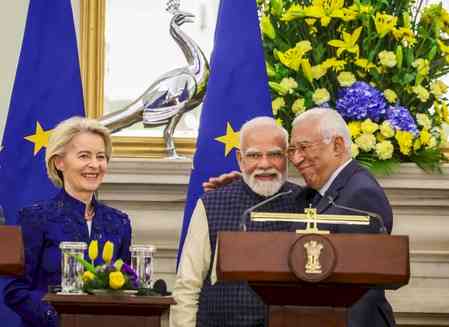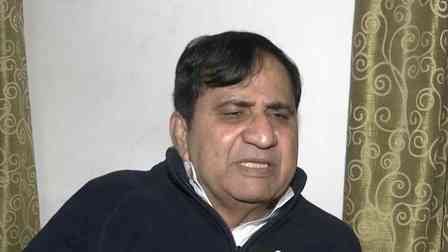Industry reactions to Union Budget 2022-23 (Part-15)

Ruchir Arora, CEO & Co-founder, CollegeDekho
“The government’s continued focus on building a quality higher education ecosystem is encouraging. The reforms allowing foreign universities in India to offer courses free of domestic regulations and the introduction of a Digital University will help bring industry best practices enabling the students with better job opportunities. Also, Animation, Visual Effects, Gaming, and Comics (AVGC) sectors are very popular with the younger generation and have great potential for employability. It's great to see the government realise this and focus on building domestic capacity to serve both our markets and the global demand. This will further push the popularity of emerging technologies and business models among the youth fueling our country’s vision of a Digital India.”
Satpal Singh, CEO, Numeric
“The decision by the government to include Data centers and energy storage systems in the harmonised list of infrastructure sectors is a welcome move. This would also spur the UPS industry towards further growth.
Major allocations pertaining to the growth of renewable energy, energy efficiency, electric mobility, energy savings and efficiency in commercial buildings, grid-connected energy storage among others are indicative of the commitment to sustainability.
The new Vibrant Villages Programme is a welcome move which is expected to trigger development in the villages of the country infrastructure.”
Anurag Sinha, Co-founder & CEO, OneScore & OneCard
“Considering we have not yet emerged out of the shadows of the pandemic; I believe the Finance Minister has done an excellent job in striking a fine balance in being fiscally prudent and growth supportive. The budget has laid out a host of top-notch measures offering a huge push for infrastructure besides incentivising manufacturing and addressing key growth driving cohorts such as MSMEs, youth and even the startup community.
The budget has laid considerable focus on public investment and capital expenditure; however, on the other side it is quite conservative in its tax growth estimates. The budget however, contains several significant reform measures and fiscal initiatives that will boost social and economic development.
Promoting digitization across sectors and levels is indeed a welcoming move which would not only speed up the processes but also bring much-needed transparency and uniformity to the system. Introducing digital currency is a dynamic decision taken by the government and would really help the economy in coming at par with developed economies. It would also streamline the current financial infrastructure, making it cheaper and faster to conduct monetary transactions. Further to promoting digital currency, the move of introducing 75 digital banking units in 75 districts will significantly strengthen the financial infrastructure across the country. All in all, with an outlay from India at 75 to India at 100, I believe this Budget is futuristic and focuses well on economic revival while ushering the next era of growth for India.”
Sudarshan Lodha, Founder & CEO, Strata
“Considering the importance laid on digitization of technologies and sectors, I would like to congratulate FM for promoting of use of deep tech and online interface across sectors to drive digitisation and ensure greater transparency. As real estate is the second largest contributor in employment generation and contributes over 10% of the total GDP, it is extremely encouraging to see budget laying policies for boosting infrastructure and introducing taxation benefits for real estate investments.
With real-estate encompassing a huge chunk of LTCG, capping long term capital gains surcharges to 15 percent would encourage real estate investors to lock in their investments for a longer period, helping them maximize their gains. This will go a long way toward accelerating pandemic-slowed real estate investments. Additionally, introducing state partnerships in SEZ development hubs and scraping of SEZ Act would encourage businesses to stay longer, driving growth and stability. Also, extending tax concessions for the startup community would help them revive their operations from the aftershocks of the pandemic.
The budget has laid out a host of measures offering huge push to the infrastructure segment, which will play a catalytic role in driving consumption, urbanization, creating employment opportunities and thereby reviving growth in the aftermath of the pandemic. All in all, it is an extremely futuristic budget with an adequate focus on economic revival and growth.”
Mandar Agashe, Founder & Vice-Chairman, Sarvatra Technologies ltd.
“It is a digital budget. It has been an overall balanced budget with many positive announcements relating to digitization. We appreciate the government for taking a step forward with its 'Digital India' initiative by proposing 75 Digital Banking units in 75 districts by scheduled commercial banks. The measure will ensure the acceleration of digital payments across the country. Further, introducing an online e-bill system will reduce payment delays and be wholly paperless and end-to-end encrypted. Given the rapid rise of digital banking, digital payments, and FinTech innovation, it was critical to develop a digital infrastructure to support digital banking, which has enormous potential. Another excellent initiative of bringing in a blockchain-based digital rupee will lead to instantaneous financial transactions instead of the current digital payment system. We foresee that the digital rupee will be a game-changer and might outperform other digital currencies which are currently available.”
Bhavin Patel, Co-founder & CEO, LenDenClub
“Union Budget 2022-23 started on a positive note with a vision for India@100. The measures announced have huge potential to pave a robust growth path for the next 25 years which can make India truly progressive, technologically advanced, and financially strong. Laying substantial focus on MSMEs who account for more than 30% of India's GDP is extremely encouraging which will go a long way in driving economic growth and employment. The 6,000-crore programme to rate MSMEs to be rolled out over the next five years and the extension of the Emergency Credit Line Guarantee Scheme (ECLGS) till March 2023 are huge strides towards enhancing capital access to MSMEs’ and making them more resilient and competitive.
Although few tax slabs were anticipated, especially if returns from Peer-to-Peer (P2P) lending investments may have been exempted under Section 80C of the Income Tax Act or a different provision could be carved out to minimize tax rates, it would have encouraged investors to invest more.
Extending the time of incorporation of the eligible start-up for tax incentives by one more year is hugely encouraging for aspiring entrepreneurs and the startup ecosystem.
Overall it is a growth-oriented budget offering a slew of measures to drive consumption, investment, and economic revival in the aftermath of the pandemic.”
Anand Kumar Bajaj, Founder, MD & CEO, PayNearby
“The Ministry of Finance has presented a well-rounded, futuristic and optimistic Union Budget 2022 to propel the digital economy and boost the MSME sector. Given that ‘inclusive development' and ‘financing of investments’ were two of the seven pillars of the Budget, it laid the foundation for faster financial inclusion and expansion of the credit ecosystem. In a bid to make MSMEs more resilient and competitive, the extension of the Emergency Credit Line Guarantee Scheme (ECLGS) till March 2023 is a critical step. This measure will ensure the continued handholding of MSMEs, which accounts for more than 30% of India's GDP and remains an important engine of economic growth, job creation, income generation and livelihood support. In addition, the proposal to skill both entrepreneurs and students with the help of technology will empower and enhance the productivity of the country altogether.
For India to become a digital economy, all villages should have the same access to digital resources as urban areas. To augment this, the setting up of 75 digital banking units in 75 districts of the country is a commitment to taking high-end tech to the bottom of the pyramid. This step will ensure that the benefits of digital banking reach every nook and corner of the country in a consumer-friendly manner. The objective of citizen empowerment with digital growth and supporting fintech will directionally encourage delivering of digitization to India in its 100th year well ahead of time.
We are happy that over the past few years we were able to focus on Aspirational Districts and deliver on one aspect of financial inclusion and the score of 95% is encouraging. Going forward, we will focus to align with the Vibrant Villages Program and will continue focusing on the financial inclusion of farmers and senior citizens at the last mile. However, we wish the GST waiver for Banking Correspondents for financial inclusion services could have been taken into consideration. During Amrit Kaal, while our government aims to achieve the vision for India@100, we pledge to make India a digitally and financially inclusive nation. Zidd Aage Badhne Ki.”
Dilip Modi, Founder, Spice Money
“It is extremely heartening to see the digital economy and fintech technology-enabled development being a key focus area for Budget 2022-23. The government’s proposal of setting up 75 Digital Banking units in 75 districts of the country and providing online fund transfer between post office accounts and bank accounts will help in adding further tailwinds to expand necessary banking services to the last mile and enable us to take a step further towards our goal of financial inclusion through rural empowerment. The government’s continuous focus on the digital payments ecosystem has paved the way for digital adoption amongst the unbanked and underbanked population of the country especially post the outbreak of the pandemic. We are hoping to see a much higher traction this year that will address the current challenges faced by the citizens and create a #AtmaNirbharBharat.
Additionally, Finance Minister Nirmala Sitharaman’s announcement on the allotment of funds through NABARD to finance start-ups for agriculture & rural enterprises along with the plans to launch delivery of hi-tech services for farmers including the use of Kisan Drones is a great move towards the development of the agri sector as well as for supporting nanopreneurs.
We are hopeful that the government’s strong support and initiatives including the introduction of digital rupee by RBI will help in accelerating the growth for the fintech sector and will create multiple avenues for the underserved parts of the country.”


 cityairnews
cityairnews 








